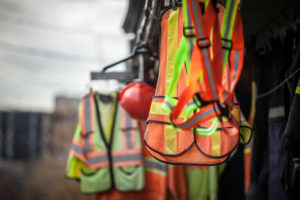All workers who are performing tasks in an unsafe environment are required to wear approved safety gear. In some cases, the safety equipment provided to workers is defective and fails – leading to a tragic or fatal injury. This can occur if the safety equipment provided by an employer is not maintained. It can also happen when an equipment manufacturer produced a defective product.
If you have been injured due to defective safety equipment, you may have the basis for a significant compensation claim. The Chicago defective safety equipment attorneys at Horwitz, Horwitz & Associates have decades of experience helping workers in Illinois. We take legal action to hold the responsible parties accountable, therefore we will seek full compensation for all damages on your behalf.

Contact Us Regarding Your Defective Safety Equipment Case
The dedicated Chicago injury attorneys at Chicago’s Horwitz, Horwitz & Associates have been helping the people of Illinois for three generations. We understand how to seek a positive jury verdict, directed judgments, settling out-of-court. Our success over the years is revealed in our extensive history of achieving multi-million dollar outcomes.
A no-cost consultation is all that it will take for us to evaluate your specific situation. We will then determine the best strategy for your next steps. You owe us nothing until we have won your case. To schedule an appointment, contact us today.
What Kinds of Defective Safety Equipment Claims Are There?
This type of injury can involve equipment and devices with a wide variety of applications. If a product or device has been designed, marketed and provided or sold on the basis that it will protect you from risk or harm and then fails to accomplish this, it is time to file a product liability case to seek full compensation for damages.
Here are some examples of the range of possibilities:
- Worker protection – Equipment or devices that are purported to prevent injury, ensure safe working conditions, etc. This could include items such as goggles, gloves, and helmets as well as safety harnesses, clothing and even such protections as the rigging intended to keep scaffolding secure.
- Helmets – The seriousness of head and neck injuries is such that this category deserves its own focus. A variety of helmets are sold for sports ranging from baseball, football, and hockey to skiing, snowboarding, biking and motorcycle riding.
- Vehicle safety equipment – This could include seatbelts, airbags, automatic braking systems, lane alerts, etc.
- Improper application or unapproved use – It’s possible that a worker could be provided with safety equipment that works if used as intended but is not appropriate for the task that they have been asked to do.
- Inadequate maintenance – Would the device that failed to protect you have done its job if it had been cared for properly? Is this a failure of equipment, or of maintenance?
Should I Have a Lawyer for My Defective Safety Equipment Case?
No injury claim is totally free of complications, twists, and turns. It is to your advantage to have an experienced construction equipment injury attorney at your side. A lawyer can help you sort out the facts of your case, its true impact, and therefore your options for achieving justice and a fair level of compensation.
Suppose you were provided a helmet on a job site that failed to protect you from falling items. Who is at fault? In many cases, it is the manufacturer. Safety equipment is used to protect the human body from harm. If the piece of equipment fails to perform as promised, leading to serious injury, we urge you to speak with our Chicago defective safety equipment lawyers at Horwitz, Horwitz & Associates at once.
Call us Today
Call our Chicago product liability lawyers at Horwitz, Horwitz & Associates if you or a loved one was injured due to faulty or defective safety equipment. You deserve an attorney who will pursue the maximum in compensation. Free case evaluation when you contact us.
Related articles :
Should I sign the papers my insurance company asks me to sign after I am injured?

















